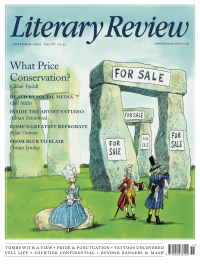Lucy Popescu
Tsitsi Dangarembga & Julie Barnes
On 29 September, a magistrates’ court in Harare served award-winning author, filmmaker and activist Tsitsi Dangarembga (LR, March 2021) and her co-defendant Julie Barnes with six-month suspended prison sentences for ‘inciting public violence and breaching the peace’. Dangarembga, sixty-three, paid a fine of around £200 to avoid being imprisoned. If they are convicted of another offence within the next five years, they will be jailed for six months. PEN and other lobby groups are appalled by the misuse of the law by the Zimbabwean authorities to harass, intimidate and punish Dangarembga and Barnes simply for exercising their legitimate right to freedom of expression by protesting against corruption and misgovernance. PEN is calling for their convictions to be urgently and unconditionally overturned by a higher court.
The pair were arrested by riot police on 31 July 2020 while non-violently demonstrating on a deserted street in Harare. At the time of the protest, Dangarembga posted this comment on social media: ‘Friends, here is a principle. If you want your suffering to end, you have to act. Action comes from hope. This is the principle of faith and action.’ In response to the demonstrations, the security services shut down most of the city, arrested several government critics and forced others into hiding.
Dangarembga, a founding member of PEN Zimbabwe, has worked as a professional writer for over three decades. Her novel This Mournable Body was shortlisted for the 2020 Booker Prize and described in these pages as a ‘mordant, often darkly witty study of postcolonial dejection’. Her debut novel, Nervous Conditions, written at the age of twenty-five (published in the UK in 1988), won a Commonwealth Writers’ Prize and was hailed by Doris Lessing and Alice Walker, as well as making it onto the BBC’s list of a hundred stories that have shaped the world in 2018. A collection of her essays, Black and Female, was published by Faber & Faber this August.
Dangarembga’s and Barnes’s convictions were the culmination of an extended campaign of judicial persecution. This began with their arrest without charge or explanation on 31 July 2020. The following day, they were arraigned on charges of ‘incitement to public violence’ and ‘breaching Covid-19 health regulations’. Dangarembga was released on bail and ordered to attend court on 18 September. She was forced to surrender her passport to the authorities and had to report to a police station every week until her court appearance. Her trial was subjected to repeated delays.
Since succeeding Robert Mugabe as president of Zimbabwe in November 2017, Emmerson Mnangagwa has stifled free expression and protest in the country. His government oversees endemic corruption, fosters instability and systematically targets opposition figures, human rights activists and journalists. Individuals have also been arrested for posting critical comments on social media. This is the climate that fuelled the 31 July protest in Harare.
Following their sentencing, Dangarembga and Barnes released a statement via Faber:
We must take this conviction as a warning sign that our freedom peacefully to express what we want as Zimbabweans in public discourse is being stripped away from us. We are being intimidated into silence and inaction as repression and corruption increase, and the quality of our lives, our hopes for our children’s lives and our children’s confidence in their futures decrease. Freedom, justice and a dignified life are our right as Zimbabwean inhabitants of our planet. We urge you all to stand peacefully for freedom, justice and dignity in our country at all times. We promise you that we will always do the same.
Readers might like to send appeals expressing dismay at the sentencing of internationally renowned writer Tsitsi Dangarembga and her fellow protester Julie Barnes; urging the authorities in Zimbabwe to drop all charges against the pair and to stop the judicial harassment of writers, journalists and other dissenting figures; seeking assurances that the government will respect Zimbabwe’s constitutional guarantees on freedom of expression and desist from arbitrary use of constitutional limitation clauses to silence public dissent; and urging the authorities to comply with their obligations under international human rights law to protect the rights to freedom of expression, association and assembly.
Appeals to be addressed to:
Emmerson Dambudzo Mnangagwa
President of the Republic of Zimbabwe
Email: info@opc.gov.zw
Twitter: @edmnangagwa
Ziyambi Ziyambi
Minister of Justice, Legal and Parliamentary Affairs
Email: justice@justice.gov.zw
Twitter: @ZiyambiZ
His Excellency Gabriel Mharadze Machinga
Zimbabwe House
429 Strand
London WC2R 0JR
Fax: 020 7379 1167
Email: zimlondon@yahoo.co.uk

Sign Up to our newsletter
Receive free articles, highlights from the archive, news, details of prizes, and much more.@Lit_Review
Follow Literary Review on Twitter
Twitter Feed
Under its longest-serving editor, Graydon Carter, Vanity Fair was that rare thing – a New York society magazine that published serious journalism.
@PeterPeteryork looks at what Carter got right.
Peter York - Deluxe Editions
Peter York: Deluxe Editions - When the Going Was Good: An Editor’s Adventures During the Last Golden Age of Magazines by Graydon Carter
literaryreview.co.uk
Henry James returned to America in 1904 with three objectives: to see his brother William, to deliver a series of lectures on Balzac, and to gather material for a pair of books about modern America.
Peter Rose follows James out west.
Peter Rose - The Restless Analyst
Peter Rose: The Restless Analyst - Henry James Comes Home: Rediscovering America in the Gilded Age by Peter Brooks...
literaryreview.co.uk
Vladimir Putin served his apprenticeship in the KGB toward the end of the Cold War, a period during which Western societies were infiltrated by so-called 'illegals'.
Piers Brendon examines how the culture of Soviet spycraft shaped his thinking.
Piers Brendon - Tinker, Tailor, Sleeper, Troll
Piers Brendon: Tinker, Tailor, Sleeper, Troll - The Illegals: Russia’s Most Audacious Spies and the Plot to Infiltrate the West by Shaun Walker
literaryreview.co.uk